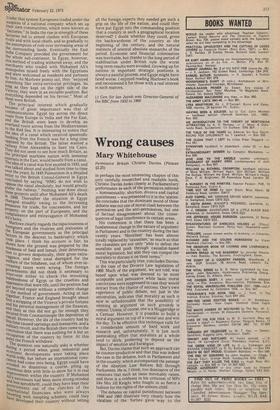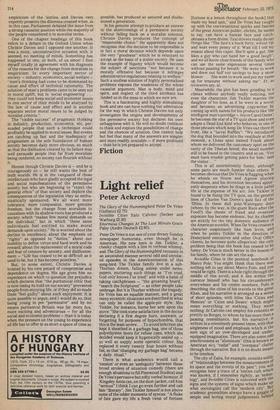Wrong causes
Mary Whitehouse
Permissive Britain Christie Davies (Pitman £3.25) In perhaps the most interesting chapter of this ,very carefully researched and readable book, Christie Davies looks closely at Parliamentary performance as each of the permissive reforms homosexuality, abortion, divorce and capital punishment was presented to it in the 'sixties. He concludes that the dominant mood of these debates was not one of moral clash between the permissives and the anti-permissives, but one of factual disagreement about the consequences of legal interference in certain areas. His contention is that there has been a fundamental change in the nature of argument in Parliament and in the country during the last twenty years. 'Moralism' has been almost totally replaced by `causalism,' so much so that the causalists are not only "able to defeat the moralists and push through causalist-based moral legislation, but also they can compel the moralists to discuss it on their terms."
This was particularly true, concludes Davies, in the case of the Divorce Law legislation of 1969. Much of the argument, we are told, was -based upon what was deemed to be most acceptable and persuasive while basic moral convictions were suppressed in case they would detract from the chance of success. One's own experience of public debate, not just in the universities, indicates that morality as such is now so unfashionable that the possibility of winning an argument on such grounds is remote. Unless, of course, one is a Muggeridge or a Cantuar. However, it is possible to build a moral argument on top of a causal one and win the day. To be effective this technique calls for a considerable amount of hard work and research and, unfortunately, It is just such painstaking effort that moralists as a whole tend to shirk, preferring to depend on the impact of emotion and harangue.
But, Davies claims that such an approach can be counter-productive and that this was indeed the case in the debates, both in Parliament and in the country, which accompanied the passage of the Abortion Law Reform Bill through Parliament. He is, I think, too dismissive of the emotions that such an issue inevitably raises, and there is a coldness in his criticism of MPs like Mrs Jill Knight who fought in so fierce a fashion for the rights of the unborn child.
The debates on capital punishment between 1948 and 1965 illustrate very clearly how the idealism of the 'forties gave way to the empiricism of the 'sixties, and Davies very expertly presents the dilemma created when, as in this case, Parliament debated the issue from a strong causalist position while the majority of the people considered it in moralist terms.
One of the chapter headings of this book refers to a debate in the Oxford Union when Christie Davies and I opposed one another. It was a noisy, unconstructive occasion with, it seemed, no meeting of minds. Something has happened to one, or both, of us since! I find myself totally in agreement with his diagnosis of the reasons for the change from moralism to empiricism. In every important sector of society — industry, economics, social welfare — 'men's thinking had come to be dominated by cause and effect of technical rationality. The solution of man's problems came to be seen not in moral uplift, but in 'social engineering' . . they could not keep social and economic issues in one sector of their minds to be analysed by the law of cause and effect and in another separate sector moral issues to be judged by moralist criteria."
The "visible success" of pragmatic thinking in industry, production, economics, etc, per suaded people that such a technique could profitably be applied to moral issues. But events are catching up fast and the inadequacy of pragmatism as the sole foundation of human society becomes daily more obvious, so much so that the disillusion created by its failure may well persuade people that far from moralism being outdated, no society can flourish without it.
Honest though Christie Davies is — and he is courageously so — he still wants the best of both worlds. He is in the vanguard of those intellectuals who have gladly accepted the legal and social manifestations of the permissive society but who are beginning to "reject the general ethos" of that society and deplore the consequences of the legislation they so enthu siastically sponsored. We all want more tolerance, more compassion, more genuine freedom, but the change from moralism to causalism with its shallow roots has produced a society which "makes few moral demands on the individual," but in which "these same individuals feel entitled to make moral demands upon society." He is worried about the decline in excellence, about the emphasis on "rights" as opposed to "duties," about our inability to define virtue and hard work and its reward; about the replacement of a moral code and fear of censure by anxiety, and disillusionment — "Life has ceased to be as difficult as it used to be, but it has become pointless."
But, to some extent, Christie Davies is hoisted by his own petard of compromise and dependence on dogma. His age gives him no experience on which to question the prejudice which declares that "the puritanical ethic that
is now losing its hold on our society" prevented,
people from enjoying life, or if they did so made them "feel guilty" about such enjoyment. It is quite possible to argue, and I would do so, that being young in pre "permissive" and by no means puritanical Britain was far more fun, more exciting and adventurous — for all the social and economic problems — than it is today when the pressure on the young to experience all life has to offer in as short a space of time as possible, has produced so satiated and disillusioned a generation.
In his genuine attempt to produce an answer to the shortcomings of a permissive society without falling back on a moralist solution, Christie Davies produces the concept of "responsible choice." He apparently does not recognise that the decision to be responsible is in fact a moral decision which depends upon the very "goodness" which he is reluctant to accept as the basis of a stable society. He uses the example of bigamy which would become the subject of sanctions "not because it is morally offensive but because it infringes administrative regulations relating to welfare." Such a soulless solution of highly personalised problems exposes the weakness of the whole causalist argument. Man is body, mind and spirit, and neglect of the third attribute has landed us in the mess in which we now are.
This is a fascinating and highly stimulating book and one can have nothing but admiration for the way in which Christie Davies not only investigates the origins and developments of the permissive society but declares his own unhappiness with it. He will no doubt continue to think and explore the possibilities of change and the chances of solution. One cannot help but feel that many of the answers are simpler and more readily available.— if more profound — than he is yet prepared to accept.



































 Previous page
Previous page